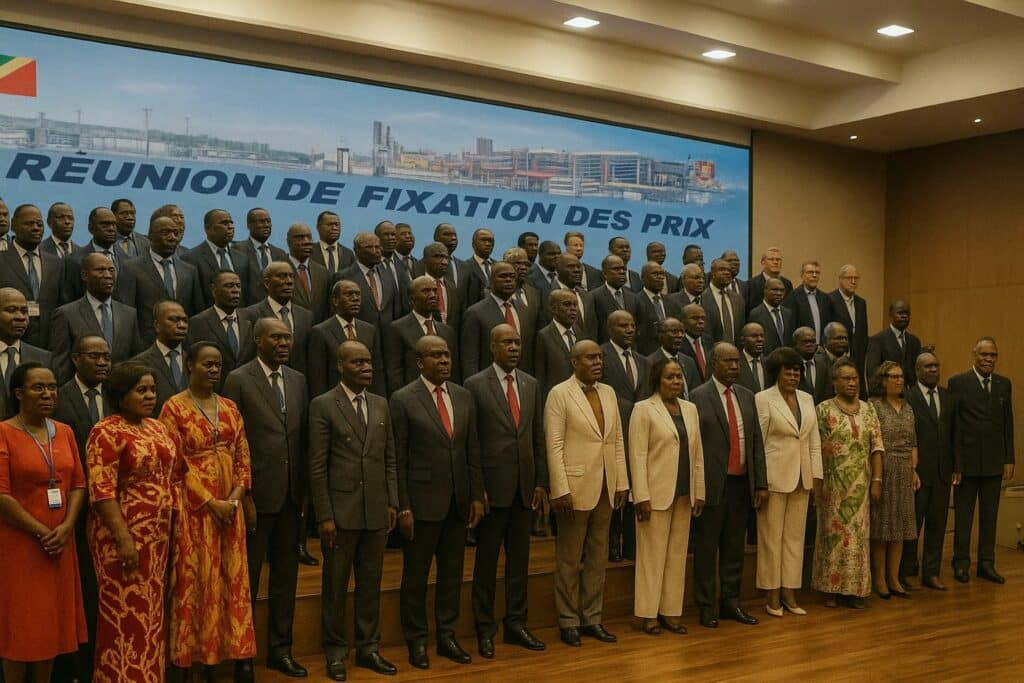Strategic conclave in Pointe-Noire fixes new fiscal bar
Against the metallic silhouette of Wing Wah Congo’s tower in Pointe-Noire, senior officials and market specialists gathered from 8 to 10 October for the quarterly exercise that anchors the Republic of Congo’s hydrocarbon revenues. Opened by Professor Macaire Batchi, chief-of-staff to the Minister of Hydrocarbons, the session reiterated the State’s commitment to predictable and transparent governance while remaining attentive to international price signals (official communiqué).
Market signals underscore cautious optimism
Participants first dissected global fundamentals. Over the reference period the dated Brent marker oscillated modestly, opening the third quarter of 2025 at USD 68.71 per barrel and closing at USD 68.94. Such narrow volatility, analysts observed, reflects a market that has partially absorbed geopolitical frictions yet still wrestles with demand uncertainties in several OECD economies. In that context the Congolese basket maintained competitive appeal. Djeno Mélange traded at an average USD 68.249, Nkossa Blend at USD 68.815, and Yombo at USD 70.402, translating into differentials of –0.531, +0.830 and +0.830 respectively against Brent. The combined performance delivered a weighted quarterly mean of USD 69.155 per barrel, only USD 0.021 above the reference grade, signalling continued alignment with prevailing international benchmarks.
Methodology overhaul seeks greater transparency
Beyond numerical calibration, the Pointe-Noire debates focused on the forthcoming methodology intended to refine price-setting rules. Jean-Jacques Ikama, Director-General for Economy, Audit and Petroleum Trading and chair of the Pricing Committee, presented the blueprint. According to officials, the reform will introduce clearer weighting of cargo quality, marketing costs and carbon intensity, providing operators with a stable and intelligible framework while safeguarding fiscal interests. Minister Bruno Jean Richard Itoua later signed the minutes alongside company executives, insisting that “the decisions we take today fit into a long-term vision” (statement at closing ceremony).
Fiscal benchmarks and competitive positioning
The new fiscal reference of USD 69.155 per barrel will inform royalty assessments, tax collection and budgetary projections for the July–September 2025 window. Government economists note that each dollar in the benchmark typically translates into several million dollars for the treasury, underscoring the macroeconomic weight of the exercise. The slight premium to Brent offers room for manoeuvre in marketing Congolese grades that are often prized for low sulphur content and stable flows. Industry sources present in Pointe-Noire described the outcome as “balanced”, ensuring competitiveness for operators while preserving the revenue envelope needed for social and infrastructure programmes.
Stakeholder voices highlight collaborative spirit
Vice-President Xiao Kaitao of Wing Wah praised the “confidence, participation and engagement” of all parties, stressing that constructive dialogue remains essential to attract long-term investment. Independent experts contacted after the meeting observed that the two-day session illustrated Brazzaville’s capacity to convene IOCs and public administrations around shared objectives, a cornerstone of the national energy strategy. For Professor Batchi, the open discussions proved that “measured transparency” can coexist with economic pragmatism, a message echoed by several attendees.
Key takeaways for policymakers and investors
The Pointe-Noire conclusions provide a snapshot of a market in equilibrium, neither overheated nor depressed, affording the Republic of Congo a window to consolidate fiscal planning. With the next pricing round already scheduled under the auspices of Eni Congo from 7 to 9 January 2026, stakeholders are encouraged to monitor both the rollout of the new methodology and the external variables—monetary policies, shipping costs, regional security—that could sway the Brent benchmark.
Legal-economic focus
Congolese regulations confer statutory force on the quarterly benchmark once countersigned by the Minister of Hydrocarbons and published in the official gazette. Operators must declare export volumes within ten working days of loading, after which fiscal liabilities are computed against the newly adopted price. Compliance teams therefore have limited time to adjust hedging instruments and contractual clauses. Analysts judge the framework robust, noting that past disputes have been settled through swift administrative conciliation rather than protracted litigation, reinforcing investor confidence.

